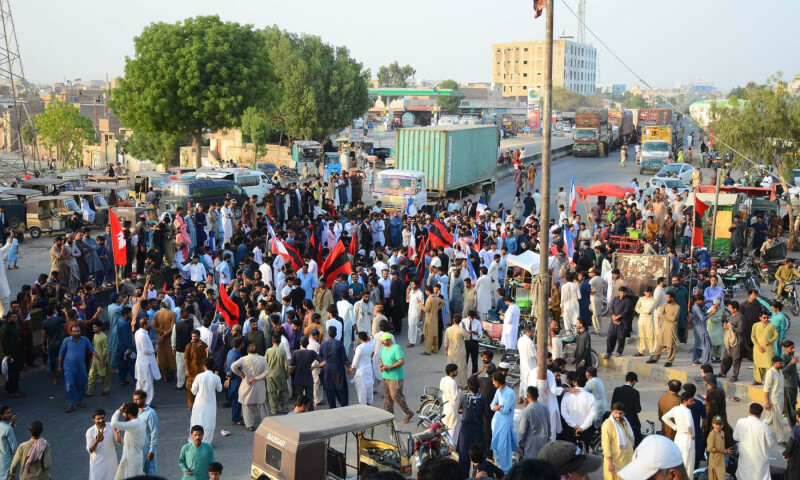• Transporters say thousands of trucks are now stranded; cargo being spoilt with each passing day
• Ports anticipate crisis; manufacturers face raw material shortages
• President wades in to resolve situation
KARACHI: Efforts to disperse protesters, who have paralysed cross-country traffic by blocking national highways in parts of Sindh, remained futile on Sunday, with manufacturers saying they have been forced to halt production due to a shortage of raw material, while port authorities also anticipate serious congestion.
The road closures in several parts of Sindh are due to continuing protests against the controversial proposal to build new canals on the River Indus.
Although the federal government and the PPP regime in Sindh have agreed to postpone the project, nationalist parties, lawyers and other civil society groups do not appear convinced by the assurance and have vowed to continue their protests until the government makes the postponement official.
According to Dawn’s correspondent in Sukkur, thousands of heavy vehicles are stuck in long queues on different roads in the Kandhkot, Kashmore, Ghotki, Sukkur and Khairpur areas.
Manufacturers and transporters are surprised by the persisting impasse, even though the provincial government has been calling on protesters to clear the roads.
On Sunday, President Asif Ali Zardari met with Sindh Chief Minister Murad Ali Shah, where the issue of the controversial projects and its fallout also came under discussion.
Sources privy to the meeting said the chief minister expressed concern over attempts by some political parties to exploit the issue for what he termed “vested interests”, referring to the ongoing protesters, staged mainly by nationalist parties in different parts of the province.
The CM also briefed the president about measures the Sindh government was taking to address public concerns and restore normalcy in affected areas, sources said.
To protest the continued blockade, the All Pakistan Goods Transport Alliance has announced plans to hold a demonstration outside the Sindh CM House at 4pm today (Monday).
Transport at a standstill
An official at the Karachi Port Trust (KPT) told Dawn that export cargo was not arriving, while imported cargo was piling up and not moving out of the port due to the closure of roads in Sindh.
“We are managing this situation to avoid congestion at the port, especially with the continuous arrival of imported goods . But in case goods movement remains held up, the port will face severe congestion, the official said.
Transporters say that in addition to worrying manufacturers and exporters, their drivers and helpers are also in a dire situation. Nisar Jafry of the All Pakistan Goods Transporters Association said that the movement of around 30,000 trucks and oil tankers was impeded.
He said that on average, one vehicle carries goods worth Rs10 million, be their meant for import, export or locally produced.
Giving an estimated headcount, he said that around 90,000-100,000 drivers and their helpers have been stranded alongside their vehicles on the highways for over 10 days now. They are also facing food and water shortages.
Transporters also alleged that protesters had damaged dozens of vehicles parked on the roads, and that over 100 sacrificial animals that were part of their cargo had already died.
Mr Jafry said he had received a call from Sindh transport minister Sharjeel Inam Memon, requesting him to call off Monday’s rally with the assurance that the roads will be cleared soon.
In a statement on Sunday, Mr Memon called on all political parties and the legal community to reopen the roads to ensure the smooth flow of goods transport, so that no one suffers any further financial or economic loss.
Due to the closures, the public, livestock, import and export sectors, farmers, and the poor are being severely affected, he said, adding that if the sit-ins must continue, the roads should be opened so that the flow of traffic is not hampered.
Representatives of the Overseas Investors Chambers of Commerce and Industry, the Oil Companies Advisory Council and the Fertiliser Manufacturers of Pakistan Advisory Council have all warned that the disruptions to the logistics supply chain are creating a severe crisis.
Although around 800-1,000 oil trucks are also stranded, the OCAC representative ruled out the possibility of a fuel shortage just yet.
Our correspondent in Sukkur also contributed to this report
Published in Dawn, April 28th, 2025


